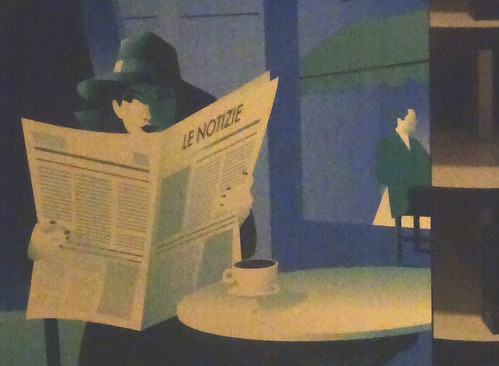Bares, qué lugares tan gratos para conversar. Antes de Gabinete Caligari, ya lo había destacado William Godwin. Aunque el autor se refiere a "public houses" la mejor traducción hoy sería bar o tasca, mejor que cafetería o pub. Proviene este elogio de los bares de los Thoughts on Man de Godwin (Essay IX, "Of Leisure", p. 187).
One of the scenes to which the leisure of the laborious classes is seen to induce them to resort, is the public-house; and it is inferred that, if their leisure were greater, a greater degree of drunkenness, dissipation and riot would inevitably prevail.
In answer to this anticipation, I would in the first place assert, that the merits and demerits of the public-house are very unjustly rated by the fastidious among the more favoured orders of society.
We ought to consider that the opportunities and amusementsof the lower orders of society are few. They do not frequent coffee-houses; theatres and places of public exhibition are ordinarily too expensive for them; and they cannot engage in rounds of visiting, thus cultivating a private and familiar intercourse with the few whose conversation might be most congenial to them. We certainly bear hard upon persons in this rank of society, if we expect that they should take all the severer labour, and have no periods of unbending and amusement.
But in reality what occurs in the public-house we are too much in the habit of calumniating. If we would visit this scene, we should find it pretty extensively a theatre of eager and earnest discussion. It is here that the ardent and "unwashed artificer," and the sturdy hudbandsman, compare notes and measure wits with each other. It is their arena of intellectual combat, the ludus literarius of their unrefined univerity. It is here they learn to think. Their minds are awakened from the sleep of ignorance, and their attention is turned into a thousand channels of improvement. Thy study the art of speaking, of question, allegation and rejoinder. They fix their thought steadily on the statement that is made, acknowledge its force, or detect its insufficiency. They examine the most interesting topics, and form opinions the result of that examination. They learn maxims of life, and become politicians. They canvas the civil and criminal laws of their country, and learn the value of political liberty. They talk over measures of state, judge of the intentions, sagacity and sincerity of public men, and are likely in time to become in no contemptible degree capable of estimating what modes of conducting national affairs, whether for the preservation of the rights of all, or for the vindication and assertion of justice between man and man, may be expected to be crowned with the greatest success: in a word, they thus become, in the best sense of the word, citizens.
—oOo—



No hay comentarios:
Publicar un comentario
Se aceptan opiniones alternativas, e incluso coincidentes: